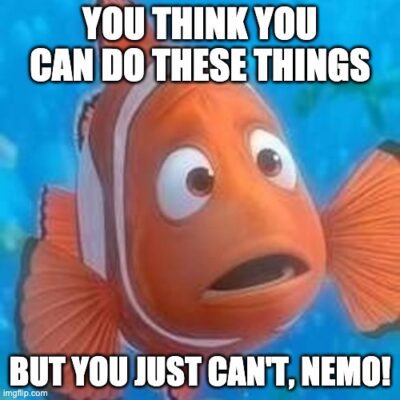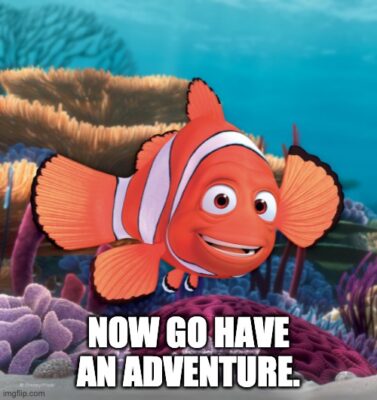When our kids were little, they were obsessed with the movie Finding Nemo – my daughter in particular. I’ve seen it probably, oh, at least 30 times start to finish – more than that if you add up all of the snippets I’ve caught as I walked through the room while they were watching.
Contrary to what most parents experience with their children’s favorites, I never minded the repetition. In fact, I have always felt a secret bond with Nemo’s dad Marlin, the clownfish. Not because he’s orange or because I’m so amusing, but because at the beginning of the movie, he’s a fearful, overprotective parent.
“You think you can do these things, but you just can’t.”
Yeah. I felt seen.
This line is sort of a joke around our house, as are many things from the movie. Case in point, all of our computers and devices are named after the characters (my new iMac is now “P. Sherman” – we’re running a little low on name options these days). But anyway, Marlin’s freakout is how I’ve often felt as I watched one of the kids attempt something that seemed not only beyond their formerly small selves, but something that scared me. I’ve bitten my tongue quite a lot, and maybe not as much as I could have. But this is not a parenting post, I promise…
What comes to my mind lately is how much we say something like this to ourselves when we want to make changes.
- “You think you can create this work schedule, but you just can’t, Ray.”
- “You think you can get this paperwork dealt with, but you just can’t, Deb.”
- “You think you can get out the door on time, with all of your crap, but you just can’t, Nigel.”
This internal monologue can work in two ways. You might have unreasonable or overly perfectionistic expectations about what’s possible (see my All Or Nothing post for more on that).
Or, you might be talking yourself out of something that is possible. Telling yourself you’re not capable before, or even after, you’ve given it a shot.
How often have I been in a coaching conversation where someone verbally lays out a logical, step-by-step approach to a challenge, only to step backward out of it? Telling me (and themselves) they have no idea how to do what they’ve just explained they know how to do? I’ve had friends and family, and even perfect strangers describe to me in great detail how they successfully arranged a storage space, only to follow up with, “But of course, I can’t organize anything.”
What’s that about?
Marlin was afraid for Nemo’s safety, and given the trauma he’d been through it was understandable. What might you be overprotecting yourself from when you approach your life order challenges? Failure? Looking foolish? Disappointing yourself? Others? You might have some understandable reasons for scolding yourself too, but that doesn’t mean they’re correct, or that they’re still relevant.
Later in the movie, Marlin repeats the same line in another context, and realizes just how automatic and reflexive his response to a challenge is. How could you disrupt a similarly reflexive monologue with yourself?
You don’t have to swim across an entire ocean, facing sharks and jellyfish and the East Australian Current, to prove to yourself that it’s ok to try. What might happen if you took an experimental approach to a problem? If everyone stopped watching over you – if YOU stopped watching over you – what could you do with that schedule, those papers, or your time?
You might come back around to understanding how much you already know. You might be able to watch yourself joyfully succeed.






Wow, Sara! I love this one. I’ve never seen “Finding Nemo,” but it sounds like a wonderful movie with a great message. More importantly, I hear YOUR message and how we often undermine our progress through the negative messages we play repeatedly.
Reframing that internal negativity and acknowledging what we are capable of are great starting points. You offer another perspective, too, about focusing on the growth or “experimental” mindset.
I also wonder if some of the negative deflecting is similar to when someone compliments us. Instead of saying a simple “Thank you,” we qualify their remark. So perhaps with the negative thinking, we can extend some grace there too. Reminding ourselves that it’s OK to progress, to fail, to succeed, to experiment. A simple, “Thank you, self. You’re working on this.”
Yes, the old “Oh thanks, but I didn’t actually do so great on that ___[fill in accomplishment]___.” That’s another “What’s that about?” situation. I think we’re all guilty of not acknowledging or downplaying our successes, which really doesn’t serve anyone. The person complimenting isn’t expecting us to deny or downplay. Eliminating the word “but” from the vocabulary helps. Thanks for the comment, Linda – and I do hope you get to see Nemo sometime!
Right? (What’s that about?) When someone (client, friend, family member) has doubts about their ability to do something that seems completely doable to me, I always try to find something similar that they’ve succeeded at and remind them of it. Even better if I can get them to think of an example first. This topic is related to my recent blog post (Do you think it will work? Why not try it?) and is yet another excuse to mention my favorite Henry Ford quote: “If you think you can do a thing, or think you can’t do a thing, you’re right.”
Good thought, to ask them to think of their own example. And I love that quote as well – the voice in the head is so powerful. Thanks for stopping by, Hazel!
These are great reminders, Sara. I was with a client the other day and asked her to reframe some of the internal dialogue she has. Reframing our recurring thoughts (much like changing the TV channel) is so important for us to move forward. To give ourselves freedom to do (fill in the blank). I like your thought of removing the word ‘but’ from our language. I’d also like to remove the word ‘try’. For me, trying implies that I may not succeed. I’d rather just go for it and if I don’t succeed at least I gave it my best effort.
Love the TV channel analogy – like going from some awful B horror movie to something like, I don’t know, Mr. Rogers. And I hadn’t thought about “try” that way before…except now I’m thinking of the misattributed Yoda quote “Do or do not, there is no try,” which has a wisdom all its own. Thanks for coming to the conversation, Diane!
You’re so smart, Sara! We’re all so good at seeing the light in one another and only the vast darkness in ourselves. This is SUCH a good reminder of the importance of reframing our knee-jerk reactions in our self-analysis. (And it reminds me of the Ford saying, “Whether you think you can, or you think you can’t – you’re right.” So stopping overprotecting ourselves from failure is the first step to success!)
Also, the first minutes of Finding Nemo scare and upset me more than the beginning of any adult movie I’ve ever seen. It’s up there with the you-know-what scene in Bambi, and the first time I watched, I had to pause and watch from the safety of the doorway, as I used to do when I was a kid. Great movie, as was the Dory followup, but that starting scene! Whoa!
Oh, honey. We couldn’t watch that first five minutes until my daughter turned like, maybe 13. It is indeed one of the rougher “kill off the parent” Disney scenes. We also had to skip the part with the sharks for quite a while. Still, it’s one of our favorites.
Thanks for the kind words, Julie.
This blog post reminds me of the quote by Henry Ford, “Whether you think you can, or you think you can’t – you’re right.”
I really think your challenge to take an experimental attitude just to see if you can is a great tactic for breaking ourselves out of the “I can’t” cycle.
That quote seems to be coming up for many people – I had totally forgotten about it. And yes, if we think of the task as a chance to observe what happens, it can take some of the pressure off. Even a slight shift in the pressure can open up a crack of opportunity. Thanks for stopping by, Phaedra!